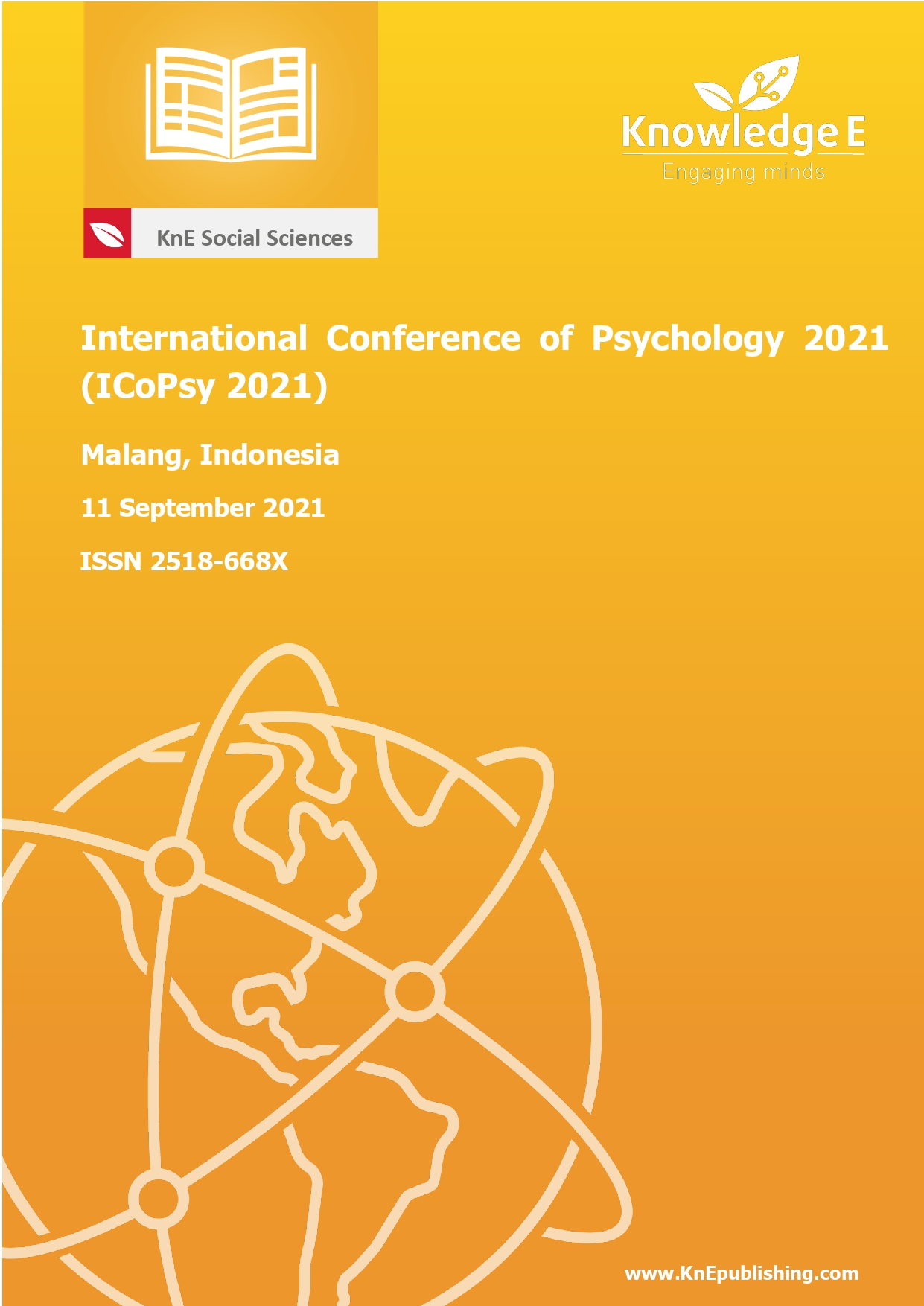The Impact of Academic Stress and Spiritual Intelligence on Subjective Well-Being in Students During the Pandemic Period
DOI:
https://doi.org/10.18502/kss.v7i1.10207Abstract
The COVID-19 pandemic has led to a shift in the learning system from offline to online. Online learning in the long term can affect the subjective well-being of students. Several previous studies have linked students’ subjective well-being with academic stress or spiritual intelligence. Thus far, studies have not examined whether academic stress and spiritual intelligence can simultaneously contribute to students’ subjective well-being. This research intended to determine the contribution of academic stress and spiritual intelligence to students’ subjective well-being. 116 students in one municipality in East Java province completed three measuring instruments, specifically the subjective well-being scale, academic stress scale, and spiritual intelligence scale. Data were tested using multiple linear regression. The findings illustrated that academic stress partially affected subjective well-being (t = 8.567; p <0.05), spiritual intelligence partially affected subjective well-being (t = 3.677; p <0.05), and academic stress and spiritual intelligence in combination affected subjective well-being (F = 44.567; p < 0.05; R2 = 0.386). These results suggested that 38.6% of the variation in subjective well-being in students could be explained by academic stress and spiritual intelligence. Therefore, in order to maintain their subjective well-being during this long pandemic, students are advised to improve their capacity to deal with academic stress and develop their spiritual intelligence.
Keywords: subjective well-being, academic stress, spiritual intelligence
References
[2] Amanah F, Situmorang NZ, Tentama F. Subjective Well-Being Mahasiswa Pada Masa Pandemi Covid-19 Dilihat Dari Hope dan Employability. Psikostudia. June 2020;10(10):1–11. DOI : 10.30872/psikostudia
[3] Diener E, Suh E, Oishi S. Recent findings on subjective well-being. Indian J. Clin. Psychol. 1997;0(0) 25–41. Available From: https://intranet.newriver.edu/ images/stories/library/stennett_psychology_articles/Recent%20Findings%20on% 20Subjective%20Well-Being.pdf
[4] Julika S, Setiyawati D. Hubungan antara Kecerdasan Emosional, Stres Akademik, dan Kesejahteraan Subjektif pada Mahasiswa. Gadjah Mada J Psychology. 2019;5(1):50- 59. DOI: 10.22146/gamajop.47966
[5] lharasati, dewi dan Nasywa N. Faktor-faktor yang mempengaruhi subjective wellbeing Lharasati Dewi Naila Nasywa. J Psikol Terap dan Pendidik. May 2019;1(1):54– 62. DOI: 10.26555/jptp.v1i1.15129
[6] Schiffrin HH, Nelson SK. Stressed and happy? Investigating the relationship between happiness and perceived stress. J Happiness Stud. 2010;11(1):33–39. DOI: 10.1007/s10902-008-9104-7
[7] Barseli M, Ifdil I. Konsep Stres Akademik Siswa. J Konseling dan Pendidik. November 2017;5(3): 143-148. DOI: 10.29210/119800
[8] O’Connor E. Student Well-Being?: A Dimension of Subjective Well-Being? partial fulfillment of the requirements for the award of Bachelor of Arts (Honours) [Theses in the Internet]. School Of Psychology (AU): University of Queensland; 2005 [cited 2020 Nov 23]. Available from: http://www.acqol.com.au/uploads/theses/thesis-oconnore. pdf
[9] Denovan A, Macaskill A. Stress and Subjective Well-Being Among First Year UK Undergraduate Students. J Happiness Stud. Springer Netherlands; April 2017;18(2):505–525. DOI: 10.1007/s10902-016-9736-y
[10] Sahebalzamani M, Farahani H, Abasi R, Talebi M. The relationship between spiritual intelligence with psychological well-being and purpose in life of nurses. Iran J Nurs Midwifery Res [Internet]. 2013;18(1)38–41. Available From: http://www.ncbi.nlm.nih.gov/pubmed/23983726%0Ahttp://www.pubmedcentral.nih. gov/articlerender.fcgi?artid=PMC3748553
[11] Brian Shendy Haryanto SH. relationship between spiritual intelligence and subjective well-being in civil servant group II Diponegoro University. ejournal3.undip.ac.id.2015:2(4):96–103.Available from: https://ejournal3.undip.ac.id/index.php/empati/article/view/7395
[12] Yuliyanto A, Indartono S. The Influence of Spiritual Quotient Toward Subjective Well- Being of Student of Muhammadiyah Boarding School Yogyakarta High School. Int J Manag Humanit. August 2019;3(12): 49–54. DOI: 10.35940/ijmh.l0342.0831219
[13] Rakhmawati I, Farida P, Nurhalimah. Sumber Stress Akademik dan Pengaruhnya Terhadap Tingkat Stress Mahasiswa Keperawatan DKI JAKARTA. JKep [Internet]. 2014;2(3):72–84. Available From: https://adoc.pub/sumber-stress-akademik-danpengaruhnya- terhadap-tingkat-stre.html
[14] Akhtar H. Evaluasi Properti Psikometris Dan Perbandingan Model Pengukuran Konstruk Subjective Well-Being. J Psikol. April 2019 ;18(1):29-40. DOI: 10.14710/jp.18.1.29- 40
[15] Wicaksana B. The relationship between academic stress and the tendency of impulsive bullying in college students [Thesis on the Internet]. Yogyakarta (Indonesia): Faculty Of Psychology Universitas Sanata Dharma; 2017 [cited 2021 Jan 4]. Available From: https://repository.usd.ac.id/9123/2/129114070_full.pdf
[16] Fitri A. Pengaruh kepribadian big five dan kecerdasan spiritual terhadap kesejahteraan subjektif. [Thesis on the Internet]. Jakarta (Indonesia): Faculty Of Psychology Universitas Islam Negeri Syarif Hidayatullah; 2019 [cited 2021 Jan 3]. Available From: https://repository.uinjkt.ac.id/dspace/bitstream/123456789/48088/1/AULIANA FITRIFPSI. pdf
[17] Amram ,Yosi, Dryer D C. The integrated spiritual intelligence Scale (ISIS) DEVELOPMENT AND PRELIMINARI VALIDATION. Am Psychol Assoc [Internet]. August 2008: 1–40. Available From: https://www.yosiamram.net/docs/ISIS_APA_Paper_Presentation_2008_08_17.pdf
[18] Herlena B, Seftiani NA. Kecerdasan Spiritual Sebagai Prediktor Kesejahteraan Subjektif Pada Mahasiswa. J Psikol Integr . 2018 ;6(1):101-105. DOI: 10.14421/jpsi.v6i1.1473 DOI 10.18502/

